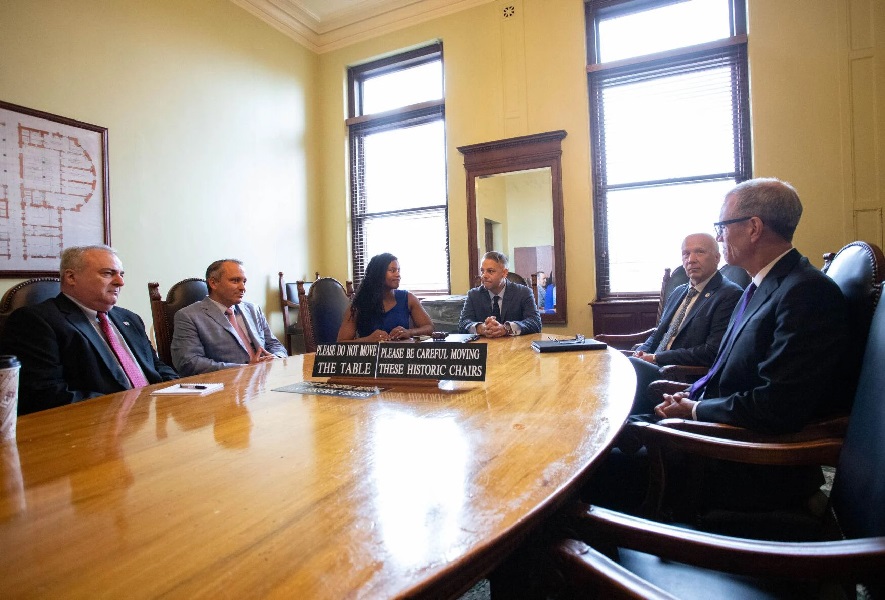latest
Massachusetts housing bill features $2 billion for public housing, $800 million for affordable units

Sam Drysdale
STATE HOUSE, BOSTON, AUG. 1, 2024…..House and Senate negotiators sent an agreement on a policy-filled $5.16 billion housing bond bill to Gov. Maura Healey Thursday morning around 9:30 a.m., potentially salvaging a priority for the House, Senate and governor.
A number of policies sponsored by both branches were left on the table, including the House Speaker Ron Mariano-backed proposal to authorize $1 billion for the expansion of the Massachusetts Water Resources Authority to the South Shore, a measure the Quincy Democrat hoped would drive housing production.
“Lots of minor stuff is not in there,” Sen. William Brownsberger, one of the lead negotiators, told reporters when he filed the compromise at 6:30 a.m. after 19 hours of open sessions in both branches as lawmakers tried to find compromises on a swath of bills.
The housing bill was one of the only major proposals to advance before formal sessions drew to a close, as relations between the branches seemed to rapidly deteriorate throughout the night of July 31 into the morning of Aug. 1.
The compromise does not include a Senate proposal to make landlords pay for broker’s fees, instead of tenants, nor does it feature Senate-backed grants: $50 million for rural and small-town housing, $50 million for mid-sized suburban town housing for communities with under 40,000 residents, and another $50 million for seasonal communities, which face unique housing challenges from the second home market that inflates housing prices.
The law also left out an apprenticeship program that the construction industry has long sought. Industry leaders say young people aren’t entering the workforce in order to build the new housing Massachusetts desperately needs.
In addition to the MWRA expansion, a number of House-backed ideas also faltered in negotiations, including an idea to steer $150 million towards converting unused commercial spaces into residential properties and $50 million for a so-called Healthy Homes program to provide grants to address lead paint and other housing health issues, and a veteran’s program.
“It didn’t include the MWRA expansion, it also does not include a lot of Senate initiatives as well. So, we put, from a financial standpoint, we did a smaller bill,” Brownsberger said.
The House wanted a $6.5 billion bill, which included the $1 billion water resource expansion, while the Senate’s bottom line was about $1 billion lower at $5.4 billion. Both were larger than the $4.1 billion base bill Healey filed.
The final bill features a high bottom line, but not all of that borrowing capacity will actually get used. The state’s plan for actual capital spending released last month dedicates $2 billion for housing over the next five years, and $400 million in fiscal 2025, a 30 percent increase over fiscal 2024.
“At the end of the day, we took an approach that was focused on the financial elements that were in common between the two bills,” Brownsberger said.
He said most of the financial proposals the governor originally had in her bill survived in the final compromise, such as $2 billion for public housing and $800 million for affordable units, as well as some policy provisions such as expanding seasonal communities designation, and expanding a condo conversion law to cover smaller two- and three-family units.
The compromise also includes an eviction sealing measure that was in Healey’s bill, Brownsberger said.
With the backing of the House, Senate and Healey, allowing accessory dwelling units by right in single-family zones across the state made its way into the final agreement. This change, allowing the smaller additions placed on larger single-family homes, could create 10,000 new units across the state, according to the governor’s team.
Also included: Senate language that would prohibit most home purchase offers that are conditioned on the buyer waiving or limiting their right to a home inspection.
The compromise report secured its final passage in the House on a 128-24 vote. It wasn’t split exactly on party lines. Republican Reps. Marcus Vaughn, David Vieira, and Steven Xiarhos joined the Democrats in supporting the bill. All other Republicans voted “no.” Democrat Reps. Colleen Garry and David Allen Robertson voted with Republicans to oppose the bill. Independent Rep. Susanna Whipps voted in favor.
In the Senate, the roll call was 37-2, with Republican Sens. Peter Durant and Ryan Fattman in opposition to the bill.






Travis Bickle
August 1, 2024 at 11:59 am
Does this mean theyll rebuild watuppa then.
David meade
August 1, 2024 at 6:50 pm
This unbelievable well, the illegal